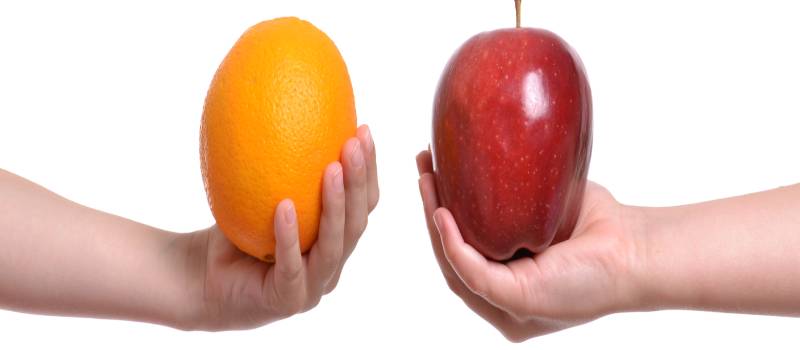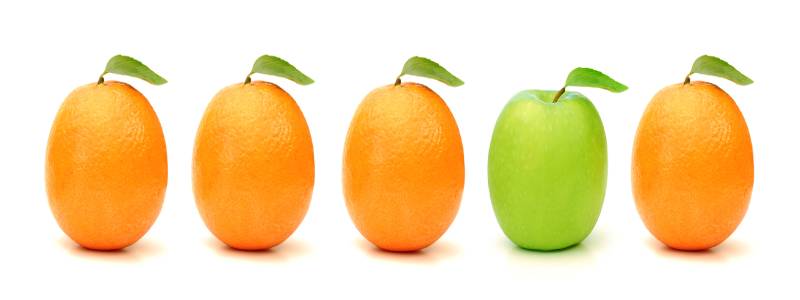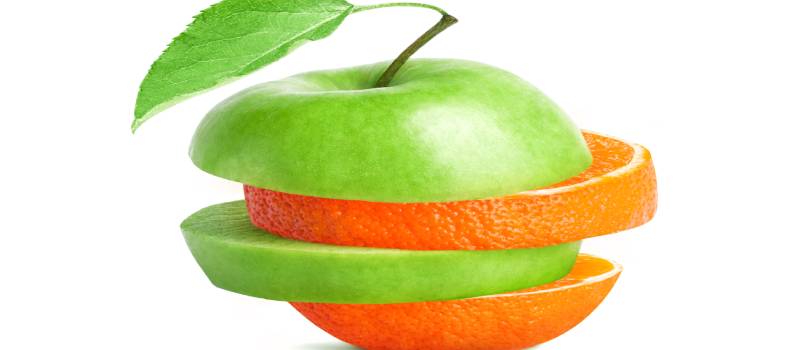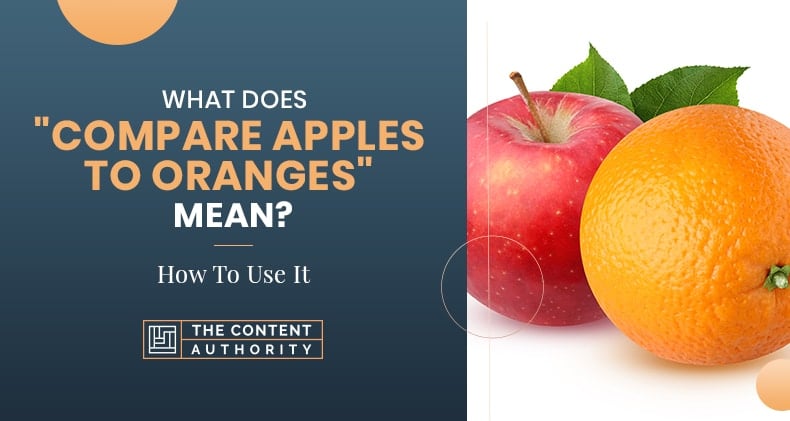“Compare apples to oranges” is an idiom of the widely spoken English Language. The meaning of the idiom is pretty clear in the combination of words as they are used. The idiom is mainly used to refute a comparison being made between items or experiences.
The true meaning of the idiom is contrasting two things that cannot be compared against each other. When two things are being compared, which are incomparable, the idiom is used to prove the unfair comparison.
The idiom “Compare apples to oranges” is used in almost all parts of the world. However, the version of the phrase changes based on the region. The primary purpose of the phrase is to point out a false analogy, so the wording can be changed when we look into different regions, but the true meaning of the idiom remains intact.
Origin Of The Phrase
The exact origin of the phrase is still unknown, but writings of the past can indeed point us in some direction. The famous writer John Ray used a similar comparison in his proverb collections of the 1670s. He used the phrase ‘Apples to Oysters’ to compare the two in his writings.
Furthermore, multiple other famous writers have also used such comparisons in their works.
Shakespeare used a similar comparison in his ‘Taming of the Shrew’ as “As much as an apple doth an oyster, and all one.” The quotation dates back to 1594.
More, used it in one of the books, namely ‘Works’ in 1532 as “No more lyke than an apple to an oyster.”
When it comes to the origin of an idiom, a phrase, or any saying, historical writings are the best way to find a source. From these writings of famous writers, we can see that the phrase or the idea of the phrase, to be precise, dates back to even before the 1500s. The writings of More and Calfhill are proof that the phrase was in use at the time.
Why Do Writers Use ‘compare Apples And Oranges?

Writers have been using idioms since the start. The writing displays real conversations or real situations, so the writer needs to add idioms or other words to make the reader feel the realism.
Writers use this idiom in order to make an incomparable comparison that people use in their everyday lives. This keeps the realism of the writer’s work and attracts the reader to the words. Because if the reader is convinced that the two speakers can really have this conversation, then the passage will be far more successful.
Variations Of The Idiom Around The World
The beauty of the idiom is that one can change the wording, and yet the meaning can remain the same. The sole purpose is to point out the false comparison between things.
People around the world use it according to their traditions. This is why this idiom has various versions, and each language contains a version of its own. It doesn’t matter what words are used in the idiom, as long as they are opposite or different from each other in order to convey the right meaning.
Let Us Have A Look At How This Phrase Is Used In Other Languages

In European French the idiom is ‘Comparer des pommes et des poires.’ Which translates to ‘To compare apples and pears.’ Another version in the same language is ‘comparer des choux et des carottes,’ translating to ‘compare cabbages and carrots.’
In Latin American Spanish, the idiom is used as ‘To compare potatoes with sweet potatoes’ or ‘To compare apples with pears.’
Other languages in which apples and pears are compared are Danish, German, Dutch, Czech, Slovak, Italian, Slovene, Luxembourgish, Spanish, Swedish and Turkish.
Another exciting way to look at the phrase would be to replace the words, which are fruits or vegetables, with something else. For example, the Serbian language has this unique way of phrasing the words, ‘Comparing grandmothers and toads.’ It seems that the words have entirely deviated from the original or widely used idiom by the looks of it. However, the exciting thing is, even after changing the wordings completely, the phrase has not lost its true meaning. We can still say that the idiom ‘Compare grandmother and toads’ means two things that cannot be compared are considered. This is how other languages have set their own standards for idioms.
Romanians also have a unique way of using it, which is; ‘To compare grandmother and the machine gun’ or ‘ Compare the cow and the long johns.’
Various other examples show the variations of the phrase around the globe. These examples show us that no matter what the words used in the phrase are, the true meaning of the idiom can remain the same.
How People Use The Phrase

On the contrary, people have also amended the phrase according to situations. Only the people who truly understand the proper meaning and idea of the phrase can amend it according to their needs. So, understanding the idea of the idiom is a must before trying to use it your way in your conversation.
In the Spanish-speaking world, the idiom has been changed to ‘To add pears with apples,’ and the Czech language uses the phrase ‘To mix apples with pears.’ Even after changing the wordings of the phrase altogether, the idea remains intact. We can see that these examples of idioms also give out the same idea as the other ones. People replace the entire phrase with something else and yet keep the idea of the idiom alive. The primary purpose should remain the same.
Many other versions exist in different languages, but these examples are enough for you to know what the variations can be. Therefore, if you are new to this idiom, you must analyze its meaning. After that, you’ll be able to identify it as an idiom and understand what the conversation is about. You can always browse the internet to study multiple other versions of the phrase to make sure you know the use of this idiom. A number of versions will be available to you, which will surely overwhelm you. So, the best suggestion would be to analyze the wordings on your own, and if it makes the same sense, you can identify it as the same idiom.
Examples
Let us look at some examples of the idiom for a better understanding.
- Sara and Salina cannot be compared. They are apples and oranges.
- They were twins, but apples and oranges.
- To compare Mexican food with Italian food is just like comparing apples and oranges.
- The couple was mismatching, just like apples and oranges.
- Comparing Novaku and Salut is impossible. It would be like comparing apples and oranges.
- The GDP ratio to Exports is very misleading and looks like one is comparing apples and oranges.
- No, it is not like that. You are comparing apples with oranges. They are both totally different jobs, with very different types of stress.
- He seems to be mixing apples and oranges. He is talking about television, not movies.
- You definitely cannot compare the new scores of the football team to the previous years. It is apples and oranges.
- You cannot compare a gaming PC with a normal one, or else you would be mixing apples with oranges.
The examples clearly display the proper use of the idiom in sentences. From the above, you can get a pretty good idea of what the phrase means and how it is used. This is the way the idiom should be used in a sentence, keeping its purpose intact.
More English Idioms
- An Apple A Day Keeps The Doctor Away
- As Genuine As A Three-Dollar Bill
- Biting Off More Than You Can Chew
To Sum Things Up
This article displays the true meaning of the phrase under discussion. You can now easily understand how to use the phrase in a sentence. The use of the idiom around the world should be much more evident now. Because as people of different languages and traditions around the world have kept their own version of the idiom, you can too. You can always choose the best way to phrase it as long as you are not falsifying the true meaning of the idiom.
Nevertheless, it is better to go with the phrase that is being used in your language as that will be the most common one and will be easier for the next person to understand. You would not expect another person to identify your version of the idiom to be accepted as an idiom.
So, stick with the better options for your conversations until you have some solid amendments which would still clarify the meaning. However, it is up to you to use the phrase as it is or to use any updated or amended version of the idiom. If the people around you understand the idiom in any form, then go ahead and make your conversations interesting and informative for others.
Shawn Manaher is the founder and CEO of The Content Authority. He’s one part content manager, one part writing ninja organizer, and two parts leader of top content creators. You don’t even want to know what he calls pancakes.

